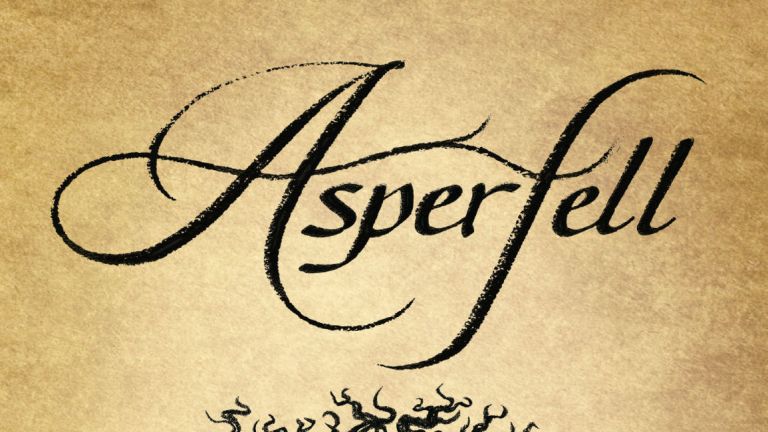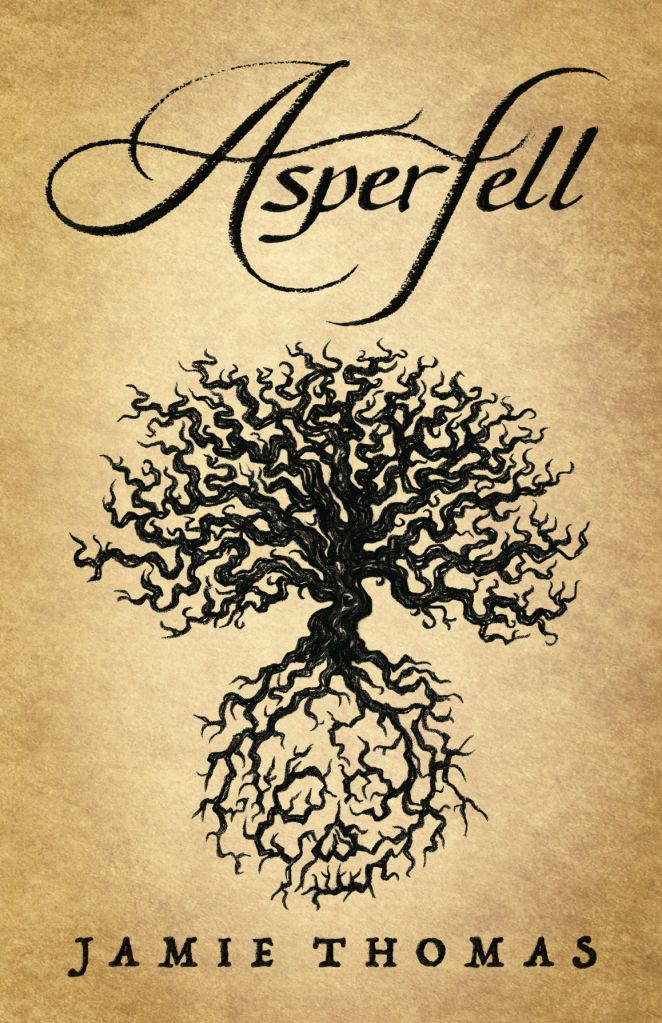One Girl Must Rescue a King From A Magical Prison in Fantasy Debut Asperfell
Looking for a fantasy world to escape into? Try Asperfell by Jamie Thomas, a story of magic and romance.

This post is sponsored by Uproar Books.
Jamie Thomas’ Asperfell, the first in a planned trilogy, is a magical fantasy with a headstrong female protagonist who, over the course of the first book, learns the true power of her voice. If you’re looking for an engaging fantasy with an original world and timeless themes, then this may be the next read for you…
When the new king of Iluviel issues a decree dictating that people with magic must serve the king or suffer execution or life-long imprisonment, Briony sees her whole world change. Unbeknownst to our noblegirl protagonist, she has magic in her blood, so she is sent away for her own protection. Briony spends her youth cavorting about the forest around her ancestral home and begrudgingly learning the lessons of being a “proper lady” at court under the rigid and withering gaze of her aunt. This all changes when Briony is given an important task: retrieve the true king from the magical prison known as Asperfell so he can right the wrongs in the land.
The only problem? No one has ever escaped Asperfell before.
In Asperfell, Thomas cleverly shows how the status quo can abruptly and horrifically change from one ruler to the next. In the book’s opening pages, the sitting king is murdered by his eldest (teenaged) son, who is sent to Asperfell, and his youngest takes the throne. In the time that follows, Briony sees life and society around her quickly change, primarily for those with magic. What starts as a simple list of those with magical blood, eventually escalates to torture, imprisonment, and executions—all simply for the “crime” of being magical.
Nobody thought much of the Registry at first… most citizens of Tiralaen agreed that an official record of those who practiced magic would benefit everyone.
This registration of a stigmatized minority is not a new concept in storytelling. We see it in the first X-Men movies with the Mutant Registration Act, inspired by the earlier comics. We also see a similar idea play out in the Marvel Cinematic Universe when the Avengers must decide whether to sign the Sokovia Accords, designed to “regulate” the activities of enhanced humans, in Captain America: Civil War. In both of these cases, these systems of registration are really systems of control and oppression.

What you see in Asperfell, much like the previous examples, is how the world eventually gets to the point of registration, warming up to the idea of a registry in order to keep the “normal” people safe from the extraordinary “other.” In Asperfell, there are some who practice magic for evil means, because of course there is, but magic is simply a tool that can be used for many different purposes. It is this shift in public policy aimed at subjugating magical folks that is the true threat, even if it is presented as the opposite.
The true shift in public sentiment from begrudging acceptance of those with magical abilities to fear occurs when the king is murdered, and his young son steps up to the crown. The young king orders rulings against all magic users. As Briony narrates in the aforementioned quote: “Nobody thought much of the Registry at first.” It happens gradually enough that the kingdom acclimates to this new world order, with society eventually becoming a hellscape for any magic user, regardless of their intentions. By then, it is too late to stop it.
When Briony grows in her magical power and knowledge, she also grows in her power as an agent of change. Her particular ability allows her to communicate with the dead souls of Asperfell—a talent no one has had at the prison in many years. “There is power in a voice such as you cannot imagine,” we hear in Asperfell, again and again. Briony’s drive to make change and to restore peace to the restless, dead souls of Asperfell make her the perfect one to shake things up in the prison. Briony often speaks her mind about circumstances at the prison, and whenever someone wants her to accept the status quo, she forges ahead. She is the perfect pairing for the voiceless dead—the ones who need her to speak for them.
Thomas brings the magical settings of Asperfell to life with vivid description, especially when it comes to describing food. A quick way to this reviewer’s heart is to describe food with enough loving and specific detail that the mouth begins to water: “Roasted pork, bitter greens, celeriac swimming in butter and stewed apples in sweet cream” or “She had brought us sweet buns filled with raisins and apples and wedges of soft, white cheese and water from a clay jug.” Much like The Hobbit or even Hunger Games before it, Thomas uses descriptions of food to highlight the richness (or lack thereof) in this world’s various settings.
The few otherworldly creatures we meet in the book are fascinating. There are the umbras, which are essentially the ghosts of magic persons, who crop up more and more as the story gains momentum, further propelling the plot with explorations of their backstories. Then there is the Moriae, a horrifying manifestation of evil that can trade crucial information for an exceedingly hefty price: your cherished memories. This monster is so clever and so unusual in its execution that it almost seems a waste to only see it in one scene in this first book. Hopefully, there will be other opportunities to further explore the moriae in future installments of the series.
Asperfell is billed as a gothic Victorian style writing, but it’s far more accessible than that description suggests. Save for the stilted “I knew not” type of language, Briony and the other characters are not overly formal in their speech patterns, and the book canters along at quite a fast pace. The style is inspired by old-world writing, without being married to the form.
Asperfell reads as a YA book but not so much that it alienates older readers. Good and bad are not so clear cut — even the inherent villains of the story, save for a thuggish character in the prison, appear to have multiple facets to their personalities. Asperfell is home to a vast array of magical people, some imprisoned for minor crimes and others for more horrific ones. Out of necessity, the worst are hidden in the bowels of the prison, separated once again by their deeds. Readers can expect to poke their nose into those dark depths and discover more about Briony and the world of Asperfell itself.
The prison of Asperfell is a complicated place, with its own civilization built around keeping the prisoners alive… at the expense of being separated from their true world. Jamie Thomas built a whole system around how this prison could work even when separate from the world for many years. Since the Gate only opens when new prisoners are chucked in, the prison has a system of magically replicating the original grain and seeds from the first time the place was outfitted, thereby enabling the prisoners to subsist on what they have. A question tugs at the reader’s mind — why not just kill all these magical ones that Tiralaen has banished? There’s reason for that too, but the answer is worthy of the reader discovering for herself. Jamie Thomas’ world building on both sides of the Gate between Asperfell and Tiralaen is impressive.
The result? Asperfell is a book about the power of a voice to speak out against injustice. Told against a backdrop of magic, its universal theme speaks to the heart of the reader on a deeply personal level. I recommend it for readers searching for a new fantasy world to sink their teeth into.
Asperfell is available now. Find our more here.
